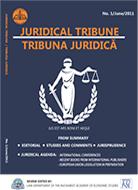The punishment’s purpose
The punishment’s purpose
Author(s): Gheorghe DiaconuSubject(s): Law, Constitution, Jurisprudence
Published by: Societatea de Stiinte Juridice si Administrative
Keywords: the punishment’s purpose; the classic penal doctrine; retributive character; prevention; suffering; positivist vision.
Summary/Abstract: The repressive reaction involves, as any human action, a certain finality. As the punishment’s essence is the suffering, then, in the course of time it has been arisen the question regarding the goal for which the society utilizes the suffering and for what the society punishes. According to the classic penal doctrine that bases on the idea of retribution, the repressive reaction was limited to a simple revenge and it didn’t existed any concern in order to influence the doer’s future behaviour. In the positivist conception, the punishment’s purpose was to shelter the society against the offender’s new attacks. Going up to an extreme point with this idea, the positivists equated the punishment with the curative treatment at which the patients in the hospitals were submitted and which it was adequate to each category of offender. For the positivists, the penal sanction, it was meant to combat the organic or the psychological anomalies or the dysfunctions of the social environment that have influenced the offender and that determined him to commit antisocial deeds. In the modern vision, the punishment cannot have a goal on its own and that is to answer to bad with bad because it doesn’t come from an abstract desire for revenge, but from a concrete necessity of hindering the repetition of the antisocial deeds and of defending the fundamental social values.
Journal: Tribuna Juridică
- Issue Year: 2/2012
- Issue No: 04
- Page Range: 133-138
- Page Count: 6
- Language: English

